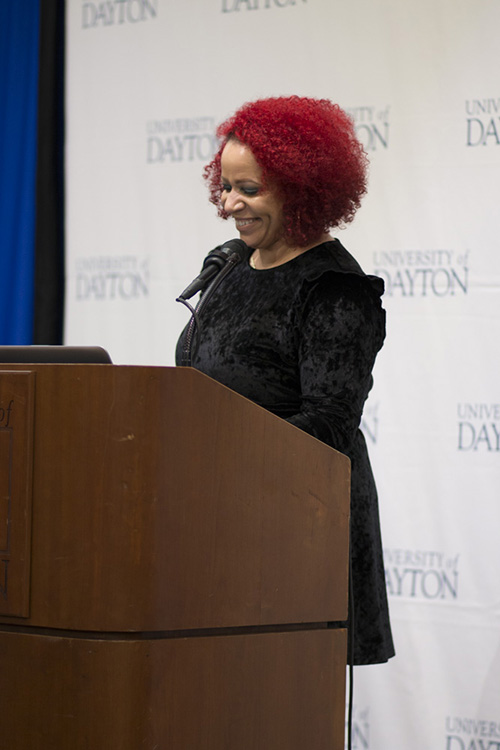A voice for justice, 50 years later
Fifty years after the assassination of the Rev. Dr. Martin Luther King Jr., another voice is speaking out against an injustice that still remains today for African-Americans in this nation—segregated schools.
Nikole Hannah-Jones, an award-winning journalist known for her reporting on racial segregation in America’s school system, was selected as the University of Dayton 2018 Rev. Dr. Martin Luther King Jr. Commemorative Speaker.
 She spoke Jan. 23 in Kennedy Union’s ballroom about America’s broken school system and how segregation in classrooms is still haunting America, nearly 70 years after the civil rights movement.
She spoke Jan. 23 in Kennedy Union’s ballroom about America’s broken school system and how segregation in classrooms is still haunting America, nearly 70 years after the civil rights movement.
Hannah-Jones began her speech by reminding the audience of King’s “I Have a Dream” speech and how it “makes us feel good” about the progress the nation has made since the 1950’s, but that America still has a long way to go.
She went on to discuss how segregation today is the result of a long history of segregating, integrating and re-segregating America’s schools.
“In the 1950s, there was complete segregation. Then, once we finally got serious about de-segregation, we saw a big increase in black children attending majority-white schools,” she said.
However, she added that in 1988, at the peak of the desegregation process, progress stalled.
“Really just one generation after we get desegregation going, we have decided as a country that we have done enough to erase 400 years of apartheid and that we are going to move on. And then, we start to re-segregate our schools, and now, our schools are segregating black children — particularly black children — as they were in the 1970’s. We have gone backwards,” Hannah-Jones explained.
She highlighted the fact that segregation was “not just a problem in the South.”
“Dayton was placed under desegregation rules in the 1970’s because Dayton operated entirely black schools with black teachers, and when a neighborhood would start to change, they would transfer all the white children out of the integrated school and turn it back into a segregated school,” Hannah-Jones said.
Wrapping things up, she drove home the point that the only statistically successful fix to the problem of segregation is integration.
“What integration does,” Hannah-Jones stated, “is it gets black kids what we guarantee for white children. That’s what it does. No more. No less,” Hannah-Jones said, citing research and statistics that point to all-white schools having better educational resources and funding.
She ended the speech by questioning how long it will take before change occurs, before African-American students get an education equal to that of white students.
“My question to all of you tonight, as we celebrate Dr. King, is to ask yourselves, ‘How much longer?’” Hannah-Jones said.